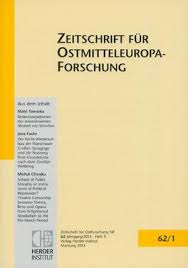Von duchinszczyzna bis zur Sonnensprachtheorie. Über die Verflechtungen zwischen polnischem Anti-Russismus und türkischem Nationalismus
From Duchińszczyzna to Sun Language Theory. On the Interconnection between Polish Anti-Russianism and Turkish Nationalism
Author(s): Arkadiusz Christoph BlaszczykSubject(s): Anthropology, Language studies, Political history, 18th Century, The Ottoman Empire
Published by: Verlag Herder-Institut
Keywords: Polish diaspora; Ottoman Empire; weak ties; renegades; transfer of knowledge; eccentric knowledge; proto-language; racial theories;
Summary/Abstract: Using case studies of Poles in exile and ‘gone native’ in the Ottoman Empire, their offspring and families, this article seeks to show how eccentric knowledge could be successfully transferred and/or remoulded by cultural in-betweens. The latter’s weak ties (Mark Granovetter) between the cultural contexts (networks) issuing and adapting the knowledge opened up creative spaces free from the knowledge-controlling forces in both contexts (such as academia). Thus the transferred or modified knowledge was either not recognized as eccentric in the adapting context (it might be deemed prestigious because of its origins) or it became so with time, by being declared eccentric in its original context. Thus emancipated, under certain circumstances the knowledge could gain considerable social and political significance in its new context. This process is illustrated in the cases of Franciszek Henryk Duchiński (1816-1893), Mustafa Celaleddin Paşa / Konstanty Borzęcki (1826- 1876), his son Enver Paşa (1856-1928) and the latter’s son-in-law Samih Rifat (1874- 1932). These represent the connection between duchińszczyzna (later a pejorative term for Duchiński’s theories) and the so called ‘Sun Language Theory’, according to which Turkish is the primeval human language, originating in the first sounds people expressed on seeing the sun. Duchiński, a controversial Polish anthropologist and historian who lived in Constantinople between 1849 and 1856, tried to counter Russian Pan-Slavist ideology by claiming that Russians were Barbarian ‘Turanian’ pretenders and usurpers of ‘Arian’ Slavdom. His concept of Turanism included the Ottomans/Turks, although, especially during the Crimean War, he defended the latter as more civilized. His reason for this was that, unlike the ‘Muscovites’, the Turks were never forced to adopt a way of life foreign to their racial nature. Konstanty Borzęcki/Mustafa Celaleddin, a rather isolated renegade reduced to the company of other Polish-born renegades, challenged and revised Duchiński’s concept of Turanism. For Borzęcki, Arians and Turanians were actually one race, and he even claimed that the Turks were the primeval European civilization (which of course excluded the Russians). Borzęcki extended Duchiński’s linguistic arguments to construct a pseudoscientific theory about the primeval character of the Turkish language. His son, Enver, inherited this approach and the latter’s son-in-law, Samih Rifat, became the first president of the Turkish Language Society. Rifat was a founding figure in the movement that led to the Sun Language Theory becoming a state doctrine in the Republic of Turkey in 1936. Finally, some of these examples indicate that resolving identity conflicts is an important driving force in intercultural entanglements and the transformation of transferred knowledge.
Journal: Zeitschrift für Ostmitteleuropa-Forschung
- Issue Year: 65/2016
- Issue No: 2
- Page Range: 215-240
- Page Count: 26
- Language: German

